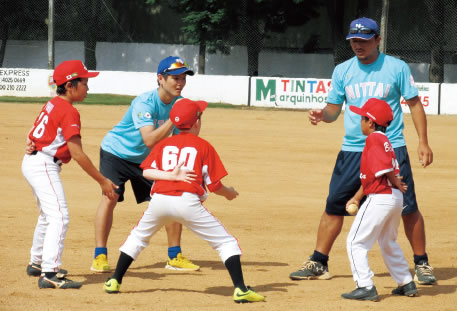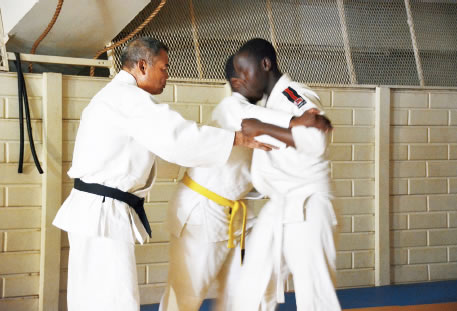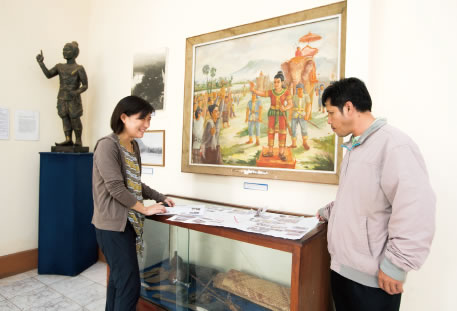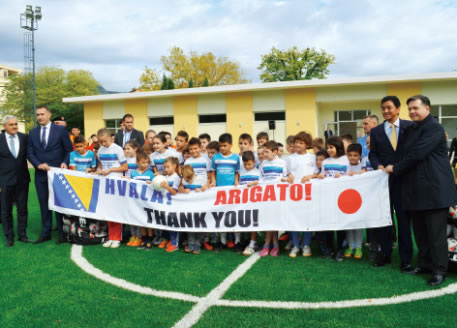(6) Culture and Sports
In developing countries, there is a growing interest in the preservation and promotion of their own cultures. Cultural heritage that symbolizes countries are sources of pride for their people, and at the same time are also resources that can be effectively utilized for tourism to develop the socio-economic environment of the people in surrounding areas. On the other hand, there is also cultural heritage which is exposed to survival crises due to a lack of funds, equipment, technologies, etc. Assistance to protect cultural heritage is a form of cooperation that directly reaches the hearts of the people in those countries, and has long-term effects. In addition, the preservation and promotion of culture, such as invaluable cultural heritage that is shared by all humankind, is an issue that should be addressed not only by the countries with cultural heritage in danger, but also by the entire international community.
Everyone is familiar with sports, and can easily take part in them regardless of their gender or age. Sports can enhance people’s quality of life as they help maintain and improve health. Furthermore, sports foster a sense of respect for opponents and cultivate a spirit of mutual understanding and awareness of norms, through competition based on fair rules and sharing of the same experience. The influence and positive power of sports play the role of “catalyzer” for the development and growth of developing countries.
<Japan’s Efforts>

JICA short-term volunteer members from the baseball club of Nippon Sport Science University provide guidance at a baseball club in Indaiatuba in Sao Paulo State of Brazil. (Photo: Yuko Watayama / JICA Brazil Sao Paulo Office)
Japan has contributed to the promotion of culture and higher education as well as preservation of cultural heritage in developing countries through Cultural Grant Assistance* since 1975. Specifically, Japan has constructed facilities necessary for preserving and utilizing cultural heritage and cultural properties, sports and cultural facilities, and facilities of higher education and research institutions in developing countries. Japan has also provided the necessary equipment for these facilities. Those facilities built in developing countries serve as centers for providing information about Japan and for cultural exchanges with Japan, as well as for deepening understanding of Japan and fostering a sense of affinity towards Japan. In recent years, from the viewpoint of “Japan Promotion,” Japan has also emphasized support for Japanese language education and support that contributes to disseminating Japanese contents.
In FY2015, Japan proactively provided sports assistance using ODA and “Projects for Sports Diplomacy Enhancement” to advance “Sport for Tomorrow,” a programme launched for the purpose of international contribution through sports through which Japan shares sporting values and the Olympic and Paralympic movement as the host country of the Olympic and Paralympic Games Tokyo 2020. Specifically, Japan utilized Cultural Grant Assistance to provide sports facilities and equipment to 15 countries, and dispatched 219 JICA volunteers in the field of sports. Japan has also decided to utilize the Grant Assistance for Cultural Grassroots Projects to assist with the preservation of cultural heritage, such as the project for the improvement of equipment for the restoration and preservation of historical structures in Nepal that were damaged by the earthquake. In addition to the above, Japan provides TV programs in three countries.

Mr. Takashi Hagino teaches judo in Gaborone, the capital of Botswana. (Photo: Hiromi Ito / JICA Botswana Office)

A Japan Overseas Cooperation Volunteer, Ms. Junko Watanabe consults with local staff in the National Museum of Laos in Vientiane while looking over an exhibition layout diagram of the exhibits. (Photo: Shinichi Kuno / JICA)
Japan supports the restoration and preservation of cultural heritage, including equipment provision and preliminary studies and surveys, through the Japanese Funds-in-Trust for the Preservation of the World Cultural Heritage established in UNESCO. Placing a particular emphasis on human resources development in developing countries based on the idea of enabling the people in those countries to protect the cultural heritage of their own country themselves in the future, Japan also endeavors to dispatch international experts, which mainly include Japanese experts, and hold workshops in order to transfer techniques and expertise to developing countries. Japan furthermore supports the safeguarding of intangible cultural heritage such as traditional dances, music, handcraft techniques, and oral lore (oral traditions) by implementing successor training, records conservation, creation of safeguarding mechanisms, and other activities through the Japanese Funds-in-Trust for the Safeguarding of the Intangible Cultural Heritage established in UNESCO.
The Ministry of Education, Culture, Sports, Science and Technology (MEXT) implements the Cooperation Promotion Program for the Protection of World Heritage and Other Cultural Properties in the Asia-Pacific Region, in which it invites young experts on cultural heritage protection from the Asia-Pacific region to Japan for training.
- * Cultural Grant Assistance
- Cultural Grant Assistance provides funding to procure equipment and supplies, and improve facilities for the promotion of culture and higher education in developing countries. It is intended to encourage cultural and educational advancements in these countries as well as cultural exchanges between Japan and the countries, with a view to deepening friendships and mutual understanding. Cultural Grant Assistance includes General Cultural Grant Assistance, which provides assistance to governmental organizations, and Grant Assistance for Cultural Grassroots Projects, which provides assistance to NGOs and local public entities for small-scale projects.
•Bosnia and Herzegovina
The Project for Rehabilitation of Sports Center in Mostar for Community Reconciliation through Sports Activities
Grant Assistance for Cultural Grassroots Projects (January 2015 – October 2016)

State Minister for Foreign Affairs Nobuo Kishi (second from right) attends the handover ceremony of the Project for Rehabilitation of Sports Center in Mostar for Community Reconciliation through Sports Activities in Bosnia and Herzegovina. (Photo: Embassy of Japan in Bosnia and Herzegovina)
The City of Mostar was once a major battlefield during the conflict in Bosnia and Herzegovina. Even more than 20 years after the end of the conflict, the city is still divided into different ethnic communities including those of Croats and Muslims. Schools also have different curriculums for different ethnic groups.
Under such circumstances, Japan helped renovate a football field and clubhouse in the sports center at the City of Mostar. This project aimed to provide children of different ethnic groups with an environment where they could interact with each other by playing sports together.
Furthermore, Mr. Tsuneyasu Miyamoto, a former captain of the Japan National Team for the Federation Internationale de Football Association (FIFA) World Cup, opened a football academy “Mali Most” (which means “Little Bridge” in the local language) where children from different ethnic backgrounds in the City of Mostar could practice football together. 53 children were participating in the academy as of October 2016 and they are playing football in the field rehabilitated with the support of Japan. JICA also plans to launch a technical cooperation project for confidence building through sports education and eventually work closely with the above-mentioned projects.
On October 9, 2016, the handover ceremony of the renovated football field and the opening ceremony of the football academy were successfully held with many guests, including Mr. Nobuo Kishi, State Minister for Foreign Affairs of Japan, and Mr. Josip Brkic, Deputy Minister of Foreign Affairs, Mr. Ljubo Beslic, Mayor of the City of Mostar, and Mr. Ivica Osim, a former head coach of the Japan National Team. The sports center is expected to offer a place for children to foster friendship and common values through sports and thus contribute to community reconciliation.
